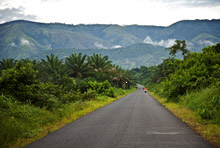
Typical street scene in Santa Ana, El Salvador. (Photo: iStock)
IMF Survey: IMF Renews Support for Burundi's Economic Reforms
January 24, 2012
- Burundi emerging from more than decade of civil conflict
- Country has made steady progress in implementing reforms
- Infrastructure needs constrain economic diversification
The IMF Executive Board approved a final $7.6 million payout to Burundi under its existing IMF loan, and also supported a new three-year loan to the central African country.

Main road out of Burundi to eastern neighbor Tanzania: Burundi’s infrastructure gap remains an impediment to growth (photo: Martin/Corbis)
THE IMF AND FRAGILE STATES
The IMF Board’s January 13 release of the final loan installment brought the total payout under Burundi’s current Extended Credit Facility arrangement to $78.3 million. The arrangement expires at end-January and the Board would then approve a successor arrangement for 2012–14 under the same facility.
In line with the authorities’ new poverty reduction strategy, the new IMF-supported program aims to alleviate key bottlenecks to growth and foster macroeconomic stability. This would also help preserve donors’ confidence by strengthening public financial management and revenue mobilization.
Policies under the new program should help boost revenue, strengthen public financial and debt management, achieve greater exchange rate flexibility, and improve the business climate. They will also help Burundi better integrate its macroeconomic policies with those of other members of the East African Community.
Burundi has been engaged with the IMF since 2002, first through Post-Conflict Emergency Assistance and subsequently through two successive loan arrangements.
Long-term engagement
Burundi’s new program draws on the lessons from an assessment of longer-term program engagement by the IMF in Burundi. The assessment focuses on a review of the country’s last two IMF-supported programs and builds on the authorities’ recently approved poverty reduction strategy.
The assessment found that despite differences in design and risk, the last two IMF-supported programs met their key objectives of encouraging macroeconomic stability, fostering policy credibility, attracting aid, and building capacity.
A key lesson was the importance of early engagement with the authorities and flexibility in program implementation. However, in light of Burundi’s narrow export base and large development needs, the country will likely to remain strongly dependent on external support; an area in which IMF engagement plays a catalytic and stabilizing role.
Key program achievements in the recent past include a notable increase in revenue mobilization with the creation of the Burundi Revenue Authority, the implementation of several public financial management reforms, and an increased autonomy of the central bank. Advances were also made in reforms aimed at improving the conduct of monetary and fiscal policies.
Progress was much slower in other areas, specifically in the coffee sector. Catalyzed by IMF-supported programs, an important surge in budget aid was spent and absorbed, stimulating domestic demand and economic growth. Despite these positive developments, Burundi still faces many challenges.
Infrastructure needs
Burundi’s large infrastructure gap is a binding constraint to higher factor productivity and economic diversification. The World Bank Doing Business report notes that 72 percent of businesses cite unreliable electricity supply as being a main impediment to growth.
With less than 2 percent of Burundi’s households currently having access to electrical energy, electricity consumption per capita remains among the lowest in Africa. In October 2011, the IMF Board approved a waiver on a program condition so that Burundi could contract a non-concessional loan to finance a critical hydroelectric plant to help meet the country’s energy needs.
Looking ahead
The country’s growth prospects depend on its success in implementing economic reforms; alleviating key bottlenecks such as improving the business climate; structural reforms in the electricity and coffee sectors; and a stable macroeconomic environment. Greater regional integration with countries in the East African Community will also be critical to unlock its growth potential through greater trade and investment.


